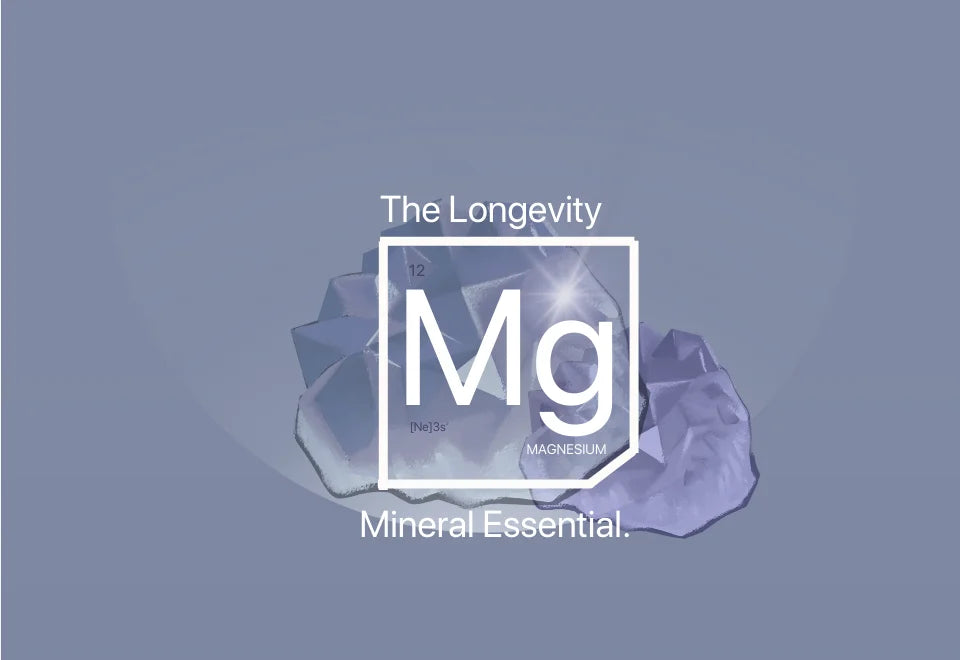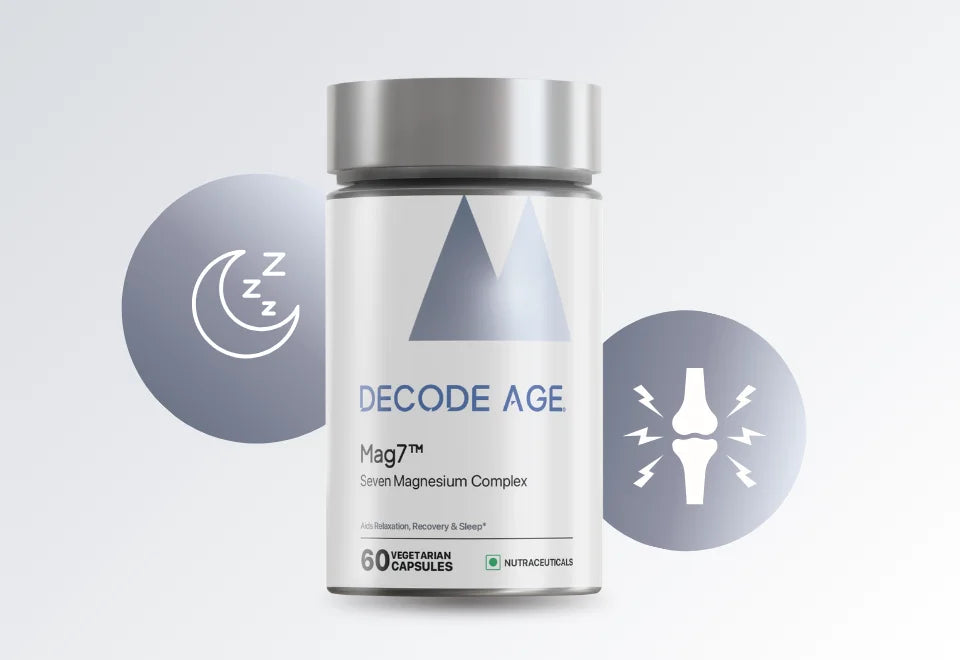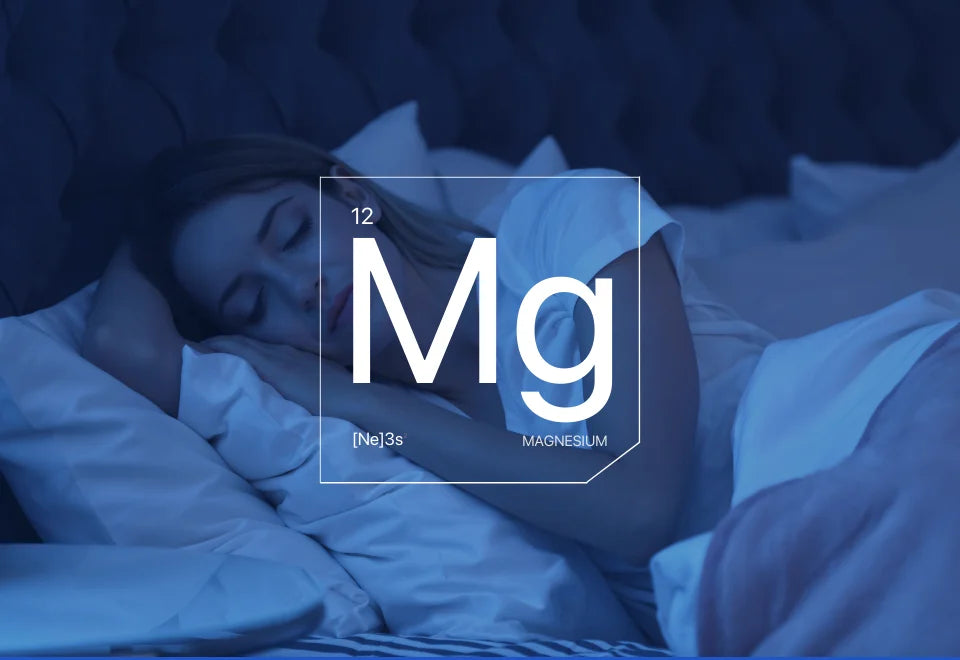Have you ever wondered why magnesium deficiency is so common? Despite the abundance of sources for the mineral, we tend to consume less of it due to processed food, demineralised water, and agricultural practices. Magnesium, a critical element that supports multiple vital physiological functions and is involved in over 300 enzymatic activities, is effective in treating and preventing illnesses such as diabetes, migraines, osteoporosis, bronchial asthma, cardiovascular disease. Despite magnesium's health benefits, most adults do not consume adequate amounts. To make up the difference, you may need to supplement with magnesium complexes. Understanding the benefits and drawbacks of magnesium complexes is critical to general health and longevity.
Is Magnesium Necessary for My Well-being?

Magnesium has a key role in regulating various body functions including muscle function, glycaemic control, nerve signalling, regulating blood pressure, energy production, bone development, and maintaining heart health. Recognising its importance, the United States Food and Nutrition Board, recommends a daily allowance of magnesium of 420 mg for males and 320 mg for females (Al Alawi et al., 2018). Despite green vegetables, nuts, seeds, fruits, fish, meat, milk products, and unprocessed cereals, being foods high in magnesium, there is a growing deficit of this vital nutrient among the public.
Magnesium deficiency can also harm different organs in the body, including the neuromuscular, cardiovascular, central neurological, metabolic, and gastrointestinal systems. Consequently, affected individuals may experience a lack of appetite, nausea, vomiting, muscle spasms and cramps, arrhythmias, hypokalaemia and hypocalcaemia, depression, and a variety of other health conditions.
If you are considered at risk for magnesium deficiency, you may receive dietary magnesium complexes, which can potentially reduce your risk of developing osteoporosis, diabetes, and migraine symptoms. Decode Age Mag7 is one of the most effective magnesium supplements available. This vegan-friendly choice has seven different magnesium complexes. It contains magnesium bisglycinate, magnesium malate, magnesium amino acid chelates, magnesium oxide, magnesium orotate, magnesium taurate, and magnesium citrate, as well as 70+ trace elements that promote better magnesium retention in the body.
Health benefits of Magnesium Forms
Magnesium complexes are composed of magnesium and additional chemicals or compounds that increase mineral bioavailability and absorption. Magnesium comes in numerous forms, including organic salt (magnesium bisglycinate, magnesium malate) and inorganic salt (magnesium oxide). The absorption potential of magnesium complexes and the purpose it serves is different for each supplement, making it necessary to choose the right one. Here’s the breakdown of 7 Magnesium Complex health benefits
Magnesium bisglycinate supplementation for better health
A chelated form of magnesium, the Magnesium bisglycinate is better absorbed than other magnesium complexes and is less likely to cause gastrointestinal side effects. It offers several health benefits, including lowering blood pressure, reducing the risk of stroke and migraine symptoms, and having a relaxing impact on the neurological system, relieving anxiety.
Chronic fatigue management with magnesium malate
Magnesium malate is a weak organic molecule present in fruits and vegetables that is known to be highly soluble and hence easily absorbed. It can relieve symptoms in patients with fibromyalgia and is utilised in the treatment of chronic fatigue syndrome.
Improving muscle function with magnesium amino acid chelate
Magnesium amino acid chelate is well-absorbed by the body and has high bioavailability. Because the substance aids in muscle contraction and relaxation, it is good for athletes or individuals experiencing muscle cramps.
Magnesium oxide for improved digestive health
This magnesium oxide compound provides a high load of elemental magnesium but has low bioavailability due to its poor solubility. Since unabsorbed salts can induce diarrhoea and have laxative effects, it's widely used for the treatment of constipation.
Magnesium orotate a vital supplement for gut and brain health
Magnesium orotate is increasingly being used for the treatment of gastroenterological disorders and psychiatric diseases. This is attributed to the potential of the Magnesium orotate’s better absorption, intracellular magnesium accumulation, and reduction in damage to the nerve cells.
Magnesium taurate, a cardioprotective supplement
Magnesium taurate is believed to have a cardioprotective and antihypertensive property, owing to its antioxidant nature. It’s an excellent choice of supplement for people looking to improve their heart health (Shrivastava et al., 2018).
Boosting general health with versatile magnesium citrate supplements
The magnesium citrate's high bioavailability makes it a popular choice for treating constipation, and muscle cramps and relieving anxiety. Supplementation with magnesium citrate has clinically shown its potential in reducing arterial stiffness (Schutten et al., 2019).
Choosing the Right Magnesium Complex Supplement
Before taking magnesium complex supplements, analyse:
- How much is your magnesium intake through diet
- Do you need additional supplementation and at what dosage
Your health status, age, gender, bioavailability, and form of supplement contribute to the selection of the right magnesium complex.
Common Magnesium Complex Side Effects
Even though considered safe, these supplements can lead to side effects, particularly at high doses. Some of the adverse symptoms are nausea, diarrhoea, abdominal cramps, and bloating, particularly at high doses, especially with magnesium oxide and magnesium citrate supplements. Excessive or extended usage of certain magnesium complexes might result in arrhythmias, low blood pressure, or seizures.
Conclusion
Magnesium complexes provide several health benefits, but selecting the proper supplement is critical to optimising your health. A high-quality magnesium complex supplement can boost mental health, increase brain activity, regulate heart health, and alleviate muscle pain. If you're seeking the best possible magnesium complex, consider Decode Age's Mag7, a revolutionary blend of magnesium salts that improves sleep quality, increases metabolism, assists muscular relaxation and repair, enhances mood, and regulates blood pressure.
FAQs
What is “magnesium complex”?
Magnesium complex is a mineral salt that contains magnesium and other ions or molecules. It is used to prevent low magnesium levels in the bloodstream. It can also be used to treat digestive disorders, like stomach upset, heartburn, and indigestion. Magnesium is an essential element that controls blood pressure, keeps muscles and neurones functioning, aids in DNA repair, and improves heart health. Because magnesium is unstable in its pure form, it is commonly offered as complexes, which enhance absorption or provide specific benefits from the supplement.
Can magnesium complex cause diarrhoea?
Magnesium supplements can cause diarrhoea with the risk being more pronounced when taking poor-quality supplements or excessive amounts. Even though the supplements are considered safe, the magnesium oxide complex is more likely to cause diarrhoea. This is because magnesium attracts water, when unabsorbed magnesium reaches the colon, it attracts water from nearby tissues, therefore, stimulating the bowel and causing the urge to pass stools. To avoid this, choose magnesium supplements that can be completely absorbed by the body to reduce adverse consequences like diarrhoea.
How much magnesium complex per day do I take?
The recommended daily allowance for magnesium (RDA) for adults is 320 to 420 mg per day. Taking a supplement can help an individual who suffers from a deficiency or does not consume enough magnesium in their diet. The recommended dose of magnesium supplement is between 200 to 400 mg per day. However, the tolerable upper limit for magnesium limit is 350 mg per day, below which you will not experience digestive side effects.
What magnesium complex is best?
The best choice of magnesium supplement for you is determined by your individual needs and the extent to which your body absorbs magnesium, among all supplements- magnesium bisglycinate is an effective option for individuals with sensitive stomachs because it does not affect digestion and is easy to absorb. A common supplement used to alleviate constipation is magnesium citrate, which has a high bioavailability. Magnesium malate is a highly absorbable supplement which may be used for treating muscle pain or fatigue. Magnesium taurate is an excellent supplemental choice for optimal heart health.
What is magnesium complex good for?
Magnesium is found in many cells of the body and is needed for various physiological functions. Therefore, supplementation of magnesium complex in those with deficiency supports sleep health and improves mood, lowers the risk of cardiovascular diseases, helps with muscle and nerve function, regulates blood pressure, supports the immune system, keeps blood sugar levels normal, aids in protein and DNA production, and contributes to bone structure development. Research also shows magnesium supplements can benefit people with medical conditions like type 2 diabetes, anxiety, high blood pressure, migraine, and depression.
What are the contraindications for magnesium supplementation?
Before administration of magnesium complex, renal function must be thoroughly assessed as decreased magnesium excretion could lead to toxicity. In patients with neuromuscular conditions like myasthenia gravis, careful monitoring is required after magnesium administration as inhibition of acetylcholine release could lead to deterioration. Magnesium should be used carefully during pregnancy since long-term treatment could lead to the development of skeletal demineralisation, hypocalcemia, and hypermagnesemia. There are no contraindications for magnesium use with other prescriptions, however, some drugs may increase or decrease the concentration of magnesium or other prescribed drugs.





























Leave a comment
All comments are moderated before being published.
This site is protected by hCaptcha and the hCaptcha Privacy Policy and Terms of Service apply.